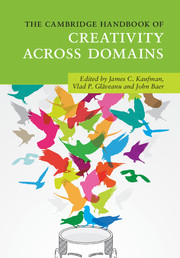Book contents
- The Cambridge Handbook of Creativity Across Domains
- The Cambridge Handbook of Creativity Across Domains
- Copyright page
- Dedication
- Contents
- Figures
- Tables
- Contributors
- Acknowledgments
- Part I Creativity and Domain
- Part II Creativity in the Traditional Arts
- Part III Creativity in the Sciences
- Part IV Creativity in Business
- Part V Newer Domains for Creativity Research
- Part VI Creativity in Everyday Life
- 29 Creativity in the Domain of Emotions
- 30 Creativity in Teaching
- 31 Culture and Creativity
- 32 The Benefits of Creativity in Therapy
- 33 Creativity in the Domain of Play
- 34 Creativity in Craft
- Part VII Conclusion
- Index
- References
33 - Creativity in the Domain of Play
Product and Processes
from Part VI - Creativity in Everyday Life
Published online by Cambridge University Press: 15 September 2017
- The Cambridge Handbook of Creativity Across Domains
- The Cambridge Handbook of Creativity Across Domains
- Copyright page
- Dedication
- Contents
- Figures
- Tables
- Contributors
- Acknowledgments
- Part I Creativity and Domain
- Part II Creativity in the Traditional Arts
- Part III Creativity in the Sciences
- Part IV Creativity in Business
- Part V Newer Domains for Creativity Research
- Part VI Creativity in Everyday Life
- 29 Creativity in the Domain of Emotions
- 30 Creativity in Teaching
- 31 Culture and Creativity
- 32 The Benefits of Creativity in Therapy
- 33 Creativity in the Domain of Play
- 34 Creativity in Craft
- Part VII Conclusion
- Index
- References
Summary
Pretend play is both a creative product and a reflection of creative processes. Pretend play is unique in that it is an open-ended activity that the child must begin from scratch; it is self-reinforcing, in that it is fun; it reflects many processes important in creativity and involves practice with those processes; it is a vehicle that can be tailored to the talents and interests of the child; it includes processes important in different domains of creativity; it is universal, it involves the whole child; and it is a safe space for the child to express themselves without being judged. Because so many processes important in creativity occur in pretend play, measures of play can indicate creative potential in children. Key studies in the area of pretend play and creativity are reviewed and suggestions for future research are offered.
- Type
- Chapter
- Information
- The Cambridge Handbook of Creativity across Domains , pp. 602 - 615Publisher: Cambridge University PressPrint publication year: 2017
References
- 1
- Cited by

